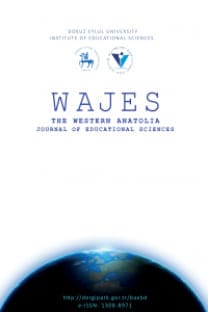Sözcük Geliştirme Aktivitelerinin Öğrencilerin Sahip Oldukları Genel Dil Seviyeleri Üzerindeki Etkisi
Bu çalışmanın amacını, sözcük geliştirme aktivitelerinin iki grup öğrenci arasında genel dil seviyeleri bakımından bir farklılık yaratıp yaratmadığının belirlenmesi oluşturmaktadır. Kontrol grubunda yer alan öğrenciler ek bir kelime çalışmasının yapılmadığı İngilizcede en sık kullanılan ikinci bin sözcüğü içeren normal müfredatı takip ederken, deney grubundaki öğrenciler ise İngilizcede en sık kullanılan ikinci bin sözcüğü içeren sözcük geliştirme aktivitelerinin normal müfredata entegre edildiği on dört haftalık programı izlemişlerdir. Bu araştırmanın çalışma grubunu, Yalova ilinde bir meslek yüksek okulunda 2010–2011 eğitim-öğretim yılında ikinci sınıfta öğrenim gören 88 erkek öğrenci oluşturmuştur. Bu çalışmada, Cambridge Hızlı Seviye Belirleme Testinin birinci versiyonu veri toplama aracı olarak kullanılmıştır. Uygulamanın ardından, deney grubu ile kontrol grubu arasında, genel dil seviyeleri açısından deney grubu lehine anlamlı bir fark oluşmuştur.
Anahtar Kelimeler:
Genel dil seviyesi, Sözcük geliştirme aktiviteleri, Sözcük öğretimi
Effects of Studying Vocabulary Enhancement Activities on Students' General Language Proficiency Levels
The purpose of this study is to determine the impact of vocabulary enhancement activities on the general language proficiency levels of foreign language students. Students in the “control” group followed the regular curriculum which included learning the second one thousand most frequently used words in English; students in the “experimental” group had a fourteen-week schedule of vocabulary enhancement activities which included integrating the same second one thousand words into the regular curriculum. The students sampled were from a vocational school in Yalova. A total of 88 male, second-year students participated in the study in the academic year of 2010–2011. After the implementation period, it was determined by using the Cambridge Quick Placement Test (QPT) Version 1 that the levels of improvement were significantly better for the students in the experimental group.
___
- Aksoy, E. (2008). The Effects of Lexical Approach on Speaking Skills of Students Who Learn English As a Foreign Language. Unpublished M.A Thesis, Ankara University, Department of Curriculum and Instruction, Ankara.
- Bozkurt, N. (2007). The Effect of Vocabulary Notebooks on Vocabulary Acquisition. Unpublished M.A Thesis, Bilkent University, Graduate School of Education, Ankara.
- Büyükkarcı, K. (2006). Teaching Phrasal Verbs to Freshman Students at Universities by Using Communicative Approach. Unpublished M.A Thesis, Selçuk University, Institute of Social Sciences, Konya.
- Chen, K. (2009). An Explanatory Mixed Methods Study of EFL College Students’ Vocabulary Knowledge, Syntactic Knowledge, and Reading Comprehension. Unpublished PhD Dissertation, Texas A&M University Kingsville, College of Graduate Studies, Texas. Conzett, J. (2000). Integrating collocation into a reading and writing course. In M. Lewis (Ed), Teaching collocation: Further developments in the lexical approach (pp. 70 87). Hove, England: Language Teaching Publications.
- Folse, K. S. (2004). Vocabulary Myths: Applying Second Language Research to Classroom Teaching. Ann Arbor, MI: University of Michigan Press.
- Harwood, N. (2002) Taking a LA to teaching: Principles and problems. International Journal of Applied Linguistics, 12(2), 139–155.
- Hatch, E., Brown, C. (1995). Vocabulary, Semantics, and Language Education, Cambridge University Press, Cambridge.
- Hwang, K. & Nation, P. (1989). Reducing the vocabulary load and encouraging vocabulary learning through reading newspapers. Reading in a Foreign Language, 6(1), 323-335.
- Nesselhauf, N. (2005). Collocations in a learner corpus. U.S. : John Benjamins Publishing Company.
- Krashen, S. D. (1989). We acquire vocabulary and spelling by reading: Additional evidence for the input hypothesis. The Modern Language Journal, 73, 440-464.
- Lee, S. H. (2003). ESL learners’ vocabulary use in writing and the effects of explicit vocabulary instruction. System, 31(4), 537–561.
- Lee, S. H., & Muncie, J. (2006). From receptive to productive: Improving ESL learners’ use of vocabulary in a postreading composition task. TESOL Quarterly, 40(2), 295–320.
- Laufer, B. (1998). The development of passive and active vocabulary in a second language: Same or different? Applied Linguistics 19,(2), 255–271.
- Laufer, B., & Hulstijn, J. (2001). Incidental vocabulary acquisition in a second language: The construct of task-induced involvement. Applied Linguistics, 22(1), 1-26.
- Meara, P.(1996). “The dimensions of lexical competence”. Ed. G. Brown, K.Malmkjaer, and J. Williams. Performance and Competence in Second Language Acquisition. Cambridge: CUP : 35–5
- Melka, F. (1997). Receptive vs. productive aspects of vocabulary. In N. Schmitt & M, McCarthy (Eds.), Vocabulary: Description, acquisition and pedagogy (pp.84–102). Cambridge, England: Cambridge University Press.
- Mondrea, J.-A., & Wiersma, B. (2004). Receptive, productive, and receptive + productive L2 vocabulary learning: What difference does it make? In P. Bogaards & B. Laufer (Eds.), Vocabulary in a second language (pp.79–100). Amsterdam: John Benjamins.
- Nation, P. (2001). Learning vocabulary in another language. Cambridge: Cambridge University Press.
- Ördem, E. (2005). Retention and Use of Lexical Collocations (verb+noun and adjective+noun) by Applying Lexical Approach in a Reading Course. Unpublished M.A Thesis, Muğla University, Institute of Social Sciences, Muğla.
- Pollitt, A. (2010). The oxford online placement test: The meaning of oopt scores. Retrieved from http://www.oxfordenglishtesting.com/uploadedFiles/Buy_tests/oopt_meaning.pdf
- Read, J. (2004). Research in teaching vocabulary. Annual Review of Applied Linguistics, 24, 14616
- Richards, J. C, & Renandya, W. A. (2002). Methodology in language teaching: An anthology of current practice. New York, NY: Cambridge University Press.
- Rubin, D. (1982). Vocabulary expansion II. New York, NY: Macmillan Publishing Co.
- Tran, T. (2011). EFL Teacher’s Perceptions About Vocabulary Acquisition and Instruction. Unpublished PhD Dissertation, Alliant International University, Graduate Faculty of the Shirley M. Hufstedler School of Education, San Diego.
- Ward, A. (2009). A Formative Study Investigating Interactive Reading and Activities to Develop Kindergartners’ Science Vocabulary. Unpublished PhD Dissertation, University of Virginia, The Faculty of the Curry School of Education, Virginia.
- Wilkins, D. A. (1972). Linguistics in Language Teaching. London: Edward Arnold.
- Yayın Aralığı: Yılda 2 Sayı
- Başlangıç: 2010
- Yayıncı: Dokuz Eylül Üniversitesi
Sayıdaki Diğer Makaleler
Introducing Comics as An Alternative Scientific Narrative in Chemistry Teaching
Karen C. WEBER, Teresa C. B. SALDANHA, Khyslayny K. DE SOUSA E SILVA, Patricia M. M. SANTOS, Dirceu D. D. SOUZA, Agnaldo ARROIO
Mert TOPKARAOĞLU, Hakan DİLMAN
Öğretmen Eğitimine Teknoloji Entegrasyonu Modelleri ve Teknolojik Pedagojik Alan Bilgisi
Nail İLHAN, Ali Rıza ŞEKERCİ, Mustafa SÖZBİLİR, Ali YILDIRIM
